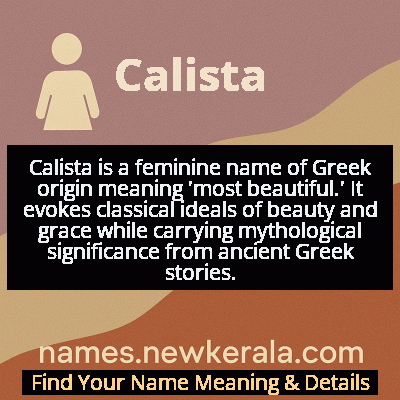Calista Name Meaning & Details
Origin, Popularity, Numerology Analysis & Name Meaning of Calista
Discover the origin, meaning, and cultural significance of the name CALISTA. Delve into its historical roots and explore the lasting impact it has had on communities and traditions.
Name
Calista
Gender
Female
Origin
Greek
Lucky Number
2
Meaning of the Name - Calista
Calista is a feminine name of Greek origin meaning 'most beautiful.' It evokes classical ideals of beauty and grace while carrying mythological significance from ancient Greek stories.
Calista - Complete Numerology Analysis
Your Numerology Number
Based on Pythagorean Numerology System
Ruling Planet
Moon
Positive Nature
Diplomatic, friendly, artistic, empathetic.
Negative Traits
Over-sensitive, moody, indecisive, prone to self-pity.
Lucky Colours
Green, cream, white.
Lucky Days
Monday.
Lucky Stones
Pearl, moonstone.
Harmony Numbers
1, 3, 4.
Best Suited Professions
Diplomats, mediators, caregivers, artists.
What People Like About You
Cooperative spirit, friendliness, artistic talent.
Famous People Named Calista
Calista Flockhart
Actress
Golden Globe winner for Ally McBeal, prominent film and television career
Calista Gingrich
Diplomat
Former U.S. Ambassador to the Holy See, political influencer
Calista Carradine
Actress
Notable television and theater actress across three decades
Calista Lyon
Artist
Internationally recognized contemporary artist and educator
Name Variations & International Equivalents
Click on blue names to explore their detailed meanings. Gray names with will be available soon.
Cultural & Historical Significance
Extended Personality Analysis
Individuals named Calista are typically associated with a blend of grace, intelligence, and creative expression. They often possess a natural elegance that combines with sharp intellect, making them both aesthetically aware and mentally agile. Calistas tend to be perceptive and emotionally intelligent, with an ability to understand complex social dynamics and respond with appropriate sensitivity. Their creative inclinations often manifest in artistic pursuits, innovative problem-solving, or unique approaches to conventional situations. Many exhibit strong communication skills and a diplomatic nature that allows them to navigate challenging circumstances while maintaining their principles. The resilience suggested by the name's mythological origins often translates into personal strength and adaptability in real-life Calistas, who typically demonstrate courage in facing obstacles and the wisdom to transform challenges into opportunities for growth. Their combination of inner fortitude and external grace frequently makes them influential figures in their social and professional circles, admired for both their capabilities and their character.
Modern Usage & Popularity
In contemporary naming practices, Calista occupies a distinctive position as an elegant, classical choice that remains uncommon enough to feel special while being familiar enough to be accessible. The name experienced a notable surge in recognition during the late 1990s following Calista Flockhart's breakthrough role in 'Ally McBeal,' which introduced the name to mainstream audiences and demonstrated its modern applicability. While it has never reached mass popularity, it maintains steady usage among parents seeking names with mythological roots, classical resonance, and feminine elegance without being overly common. Current usage trends show it appearing more frequently in educated, urban communities where parents often value names with historical depth and cross-cultural appeal. The name's easy pronunciation in multiple languages contributes to its international suitability, while its connection to Greek mythology appeals to those interested in classical education and literary traditions. Its position outside the top 500 names ensures it remains distinctive without being obscure.
Symbolic & Spiritual Meanings
The name Calista carries rich symbolic meanings that extend far beyond its literal translation of 'most beautiful.' Symbolically, it represents the ideal of beauty that encompasses both external grace and internal virtue, reflecting the ancient Greek concept of kalokagathia where physical beauty and moral goodness are inseparable. The mythological transformation of Kallisto into a bear and then a constellation adds layers of symbolism including resilience through adversity, the connection between earthly and celestial realms, and the idea that true essence transcends physical form. The bear symbolism brings connotations of protective strength, wild wisdom, and maternal power, while the stellar connection suggests guidance, permanence, and cosmic significance. Metaphorically, Calista represents the journey of self-discovery and transformation - the process through which individuals uncover their true nature and potential despite external circumstances. The name also symbolizes the Renaissance ideal of humanistic excellence, where beauty, intelligence, and virtue combine to create a complete and admirable individual.

